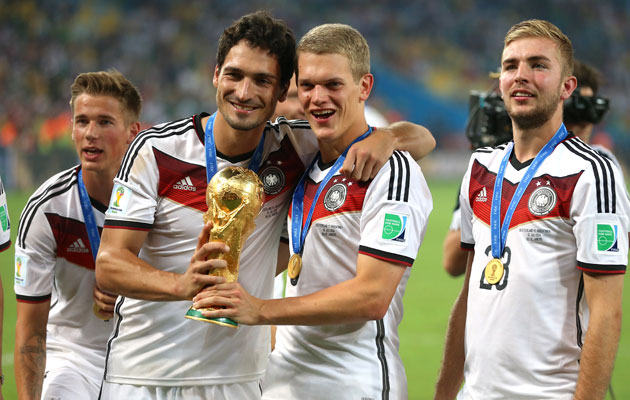World Soccer: How strong is your appetite for the game after such an intensive summer and the many stresses of the World Cup in Brazil?
Mats Hummels: My lust for football returned very quickly indeed. As far as motivation is concerned, I’m now in a completely different place compared to what I experienced after the 2012 European Championship [when he was widely criticised following the semi-final defeat to Italy]. When a tournament ends with a positive result, it’s much easier, simpler, mentally.
How are you physically? Your club coach, Jurgen Klopp, has been talking about the possibility of top players suffering from burn-out…
I agree. I also think we’ve long since reached the end of the road. Rotation helps, but only when the squad is injury free. It’s not possible for players to compete extensively in three different competitions. The game today is more and more intense. In the past, there were less games and the tempo wasn’t so high. It’s understandable that we now have more injuries.
Because of frequent midweek games, a season almost has no pauses…
My personal experience is that every game is becoming more important. For this reason, the off-season and the 10-day winter break are vital and have to be retained at all cost. We have to make the most of these short breaks, to switch off and look after ourselves. It’s the only way to stay at a mentally high level. With Euro 2016, the Confederations Cup and then the World Cup in Russia coming up, there will be fewer chances to rest.
What has changed for you personally since the World Cup win?
I’m being spotted in the street much more. People want autographs, to take photos, and it even happens on holiday. Sometimes, I end up saying that I can’t give any more autographs or pose for more pictures. And most understand.
Would you like to swap places with your brother, Jonas, who plays in the third division with Unterhaching and can walk through the streets of Munich without being recognised ?
The first thing about my job I’d give up is being noticed in public. It’s only a small negative side effect, but it’s true that you can no longer be a private individual. That said, it’s part and parcel of my profession.
Which moments from the World Cup are most prominent in your memory?
There are so many. Naturally, Mario’s [Gotze’s] goal in the Final. Then my goal against France, and the moment when Messi missed with a free-kick in the 120th minute of the Final. He shot over and I said to myself: “That’s it.”
You are a world champion, you’ve won two Bundesliga titles and played in a Champions League Final. What still drives you on in sport?
I’ve always had fun playing football and working on the training ground. Like lots of others, I’m ambitious and it’s in my nature to win everything I can and to get annoyed when it doesn’t go right. This will not change because I’m a world champion.
Philipp Lahm quit the national team, wanting to concentrate on Bayern. Can you imagine yourself making the same decision at the age of 30?
That I can’t say. But what I do know is that if was in Philip’s shoes, I’m sure I would have handled it in exactly the same way.
Lahm has gone, as have Miroslav Klose and Per Mertesacker. What will you miss about such long-serving players?
As everyone who has met him will tell you, Per is a great guy. His number one strength is his calmness and he knows how to put things into perspective. You can have a good chat with him about anything, not just football. Per, Philipp and Miro were key members of the team for so long; it will take a little rearranging.
You have a contract with Borussia Dortmund until 2017. When and how could another club tempt you?
I’ve always said Dortmund’s way of playing perfectly fits my ideas on the game. When making a judgement on the best club for me, I think more about having fun than joining a team which is supposed to be better. If a so-called big club comes in for me and I don’t think I can express myself with them, there’s no point considering it.
Dortmund have conceded a number of relatively soft goals this season, especially from set-pieces…
Teams always go through such phases in a season and we shouldn’t get crazy about it. When we won the championship in 2010-11, I remember us letting in last-second equalisers in games against Stuttgart, Mainz and Kaiserslautern, and when we defended the title the next year we had six points after the first five games. Seldom does a team stroll through a complete season.
Any conclusions to draw at this point?
In midfield alone we’ve had seven players out through injury recently. That’s hard to absorb at any time. I’m convinced things will pick up if we have fewer injuries.
Because of Dortmund’s disappointing start to the season, are you concerned you have lost too much ground in the race for a Champions League spot?
Our rivals for a top-three finish are the usual suspects, but I’m not sure any of them have made a dream start. In a post-World Cup season it’s not simple to get it all together.
Interview by Oliver Bitter (Kicker/ESM)







